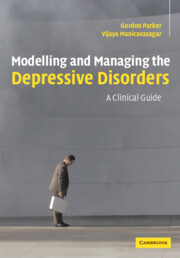Book contents
- Frontmatter
- Contents
- Acknowledgements
- Introduction
- Part I The current model for depressive disorders and its impact on clinical management
- 1 A declaration of independence
- 2 Defining and diagnosing depression
- 3 Depression sub-typing: independence and interdependence
- Part II The diagnosis and management of melancholic and psychotic depression
- Part III An introduction to non-melancholic depression
- Part IV Modelling and managing the non-melancholic depressive disorders
- Appendix 1 The DMI-18 and the DMI-10
- Appendix 2 The CORE system of measuring psychomotor disturbance
- Appendix 3 The temperament and personality measure
- References
- Index
1 - A declaration of independence
from Part I - The current model for depressive disorders and its impact on clinical management
Published online by Cambridge University Press: 17 August 2009
- Frontmatter
- Contents
- Acknowledgements
- Introduction
- Part I The current model for depressive disorders and its impact on clinical management
- 1 A declaration of independence
- 2 Defining and diagnosing depression
- 3 Depression sub-typing: independence and interdependence
- Part II The diagnosis and management of melancholic and psychotic depression
- Part III An introduction to non-melancholic depression
- Part IV Modelling and managing the non-melancholic depressive disorders
- Appendix 1 The DMI-18 and the DMI-10
- Appendix 2 The CORE system of measuring psychomotor disturbance
- Appendix 3 The temperament and personality measure
- References
- Index
Summary
This book is provocative, deliberately so. It reflects frustration and disappointment at current modelling and consequently current treatments of depressive disorders. We will argue that conceptualising and modelling the depressive disorders along a dimensional continuum of severity has led to sterility of thought, clinical practice and research findings. It is time to make a ‘Declaration of Independence’.
To paraphrase an address to the US Congress in 1776:
When in the course of human events, it becomes necessary to dissolve the dimensional view spuriously connecting one depressive condition with another, and to assume that separate or relatively independent conditions exist, a decent respect to the opinions of mankind requires that we should declare cause which impel us to argue for such separation.
We hold the following truths to be self-evident – that the depressive disorders are not all equal and that those endowed by their creator to enjoy the unalienable rights of life, liberty and the pursuit of happiness, are also entitled to a more sophisticated assessment and management model if they develop a depressive condition. We further declare that, as the current model of depression is destructive to that objective, it is the right of the people to expose its limitations, criticise it, and pour scorn on its quality of explanatory power. Prudence, indeed, dictates that DSM and ICD models long established should not be changed for light and transient causes but, all experience has shown, organisations are more disposed to continue, despite the associated sufferable nonsense, than to right themselves by abolishing the forms to which they have become accustomed. […]
- Type
- Chapter
- Information
- Modelling and Managing the Depressive DisordersA Clinical Guide, pp. 3 - 13Publisher: Cambridge University PressPrint publication year: 2005
- 1
- Cited by



